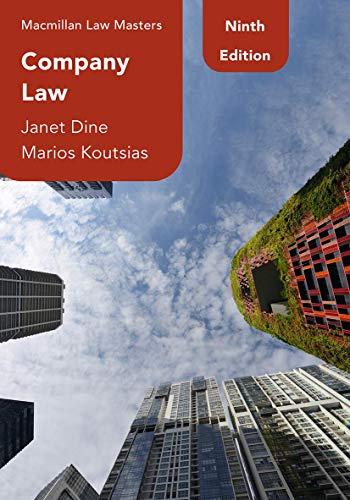Question
TRUE / FALSE1. The four main requirements for a valid will are legal capacity, testamentary capacity, testamentary intent and compliance with statutory formalities. TRUE /
TRUE / FALSE1. The four main requirements for a valid will are legal capacity, testamentary capacity, testamentary intent and compliance with statutory formalities.
TRUE / FALSE2. The most common age adapted by the Uniform Probate Code (UPC) to execute a will is twenty one.
TRUE / FALSE3. The four elements of testamentary capacity are to comprehend the action beingtaken, know the nature of the property, know the identity of presumptive heirs andhold the first three elements in mind long enough to make a reasoned judgment.
TRUE / FALSE4. The fact that a testator lacked capacity moments before or moments after a will execution will prevent a court finding the existence of testamentary capacity.
TRUE / FALSE5. A person under the influence of drugs or alcohol or disorientation from a recent accident or medical procedure may not indicate lack of capacity.
TRUE / FALSE6. Attested wills are wills that are witnessed by persons who saw the testator sign the will.
TRUE / FALSE7. The signature of the testator confirms approval of the will and gives the will an aura of finality.
TRUE / FALSE8.To add greater formality, it is common practice for a testator to sign a testimon clause that declares the instrument to be a will and the date the will was signed.
TRUE / FALSE9. An attestation clause is a provision of a will that recites that the testator has duly executed a will.
TRUE / FALSE10. A self-proving affidavit is a statement by the testator and the witnesses affirming under oath that all the requirements of a valid will have been satisfied.
TRUE / FALSE11. A holographic will is a will prepared in the testator's own handwriting.
TRUE / FALSE12. A bequest is a gift of real property.
TRUE / FALSE13. A devise is a gift of personal property.
TRUE / FALSE14. A legacy is a gift of money.
TRUE / FALSE15. A residuary gift refers to the property remaining after all specific, general and demonstrative gifts have been satisfied.
TRUE / FALSE16.A charitable gift is a gift that benefits society towards the relief of poverty, the advancement of education, support of religion or the promotion of health.
TRUE / FALSE17. Ademption by satisfaction refers to the failure of a specific gift because the property is not in the testator's estate when the testator dies.
TRUE / FALSE18. Ademption by extinction is the failure of a testamentary gift because the testator has already transferred the property to the beneficiary between the signing of the will and time of death.
TRUE / FALSE19. The appreciation or depreciation of specifically gifted property between the time of the signing of the will and the testator's death is not considered when distributing the testator's property.
TRUE / FALSE20. Interest, if any, earned by a legacy prior to testator's death does not pass to the beneficiary, as it is not part of the money that testator is actually giving.
TRUE / FALSE21. In order to protect a surviving spouse from being disinherited or receiving a very small share, the surviving spouse is given the right to a "forced shared" of the deceased spouse's estate.
Step by Step Solution
There are 3 Steps involved in it
Step: 1

Get Instant Access to Expert-Tailored Solutions
See step-by-step solutions with expert insights and AI powered tools for academic success
Step: 2

Step: 3

Ace Your Homework with AI
Get the answers you need in no time with our AI-driven, step-by-step assistance
Get Started


